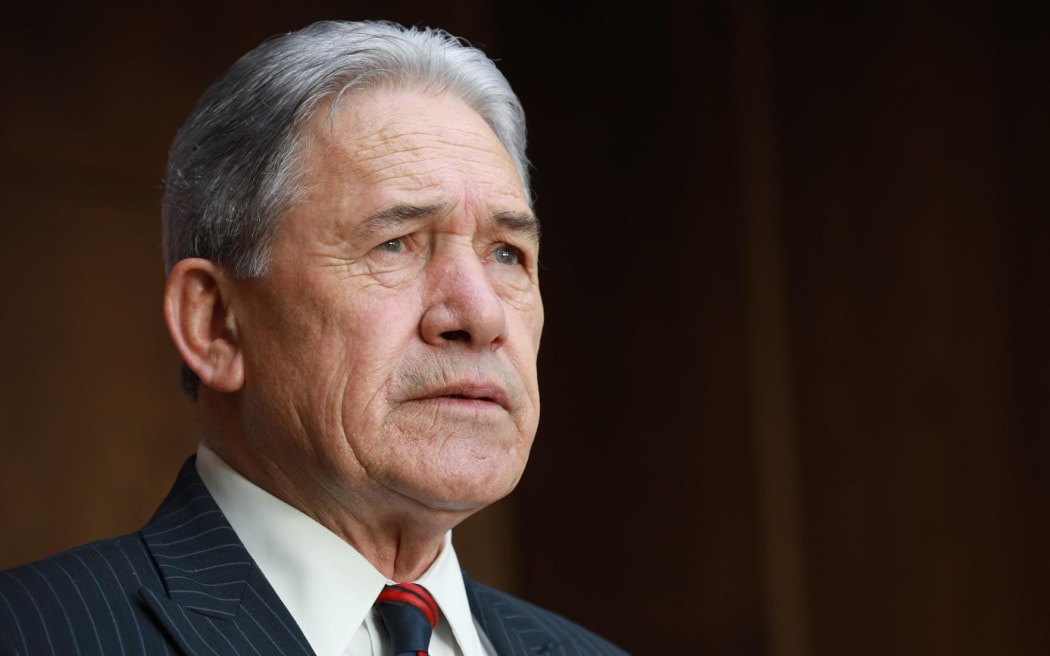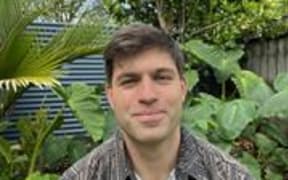By Eleisha Foon, RNZ Pacific senior journalist
A Pacific regionalism academic has called out New Zealand’s Foreign Affairs Minister Winston Peters for withholding information from the public on AUKUS and says the security deal “raises serious questions for the Pacific region”.
Auckland University of Technology academic Dr Marco de Jong said Pasifika voices must be included in the debate on whether or not Aotearoa should join AUKUS.
New Zealand is considering joining Pillar 2 of the agreement, a non-nuclear option, but critics say this could be seen as Aotearoa rubber-stamping Australia acquiring nuclear-powered submarines.
New Zealand is considering joining Pillar 2 of the agreement, a non-nuclear option, but critics say this could be seen as Aotearoa rubber-stamping Australia acquiring nuclear-powered submarines.
On Monday, Peters said New Zealand was “a long way” from making a decision about participating in Pillar 2 of AUKUS.
He was interrupted by a silent protester holding an anti-AUKUS sign, during a foreign policy speech at an event at Parliament, where Peters spoke about the multi-national military alliance.
Peters spent more time attacking critics than outlining a case to join AUKUS, de Jong said.
Investigating the deal
Peters told RNZ’s Morning Report the deal was something the government was investigating.
“There are new exciting things that can help humanity. Our job is to find out what we are talking about before we rush to judgement and make all these silly panicking statements.”
The Minister answers questions following his speech from media, including on the strategic environment, AUKUS Pillar 2, defence spending, leadership in 🇳🇿’s national security system, and bipartisanship in 🇳🇿 foreign policy. pic.twitter.com/BSSolJLhHQ
— Winston Peters (@NewZealandMFA) May 1, 2024
According to UK’s House of Commons research briefing document explaining AUKUS Pillar 2, Canada, Japan and South Korea are also being considered as “potential partners” alongside New Zealand.
Peters said there had been no official invitation to join yet and claimed he did not know enough information about AUKUS yet.

However, Dr de Jong argues this is not the case.
“According to classified documents New Zealand has been in talks with the United States about this since 2021. If we do not know what it [AUKUS] is right now, I wonder when we will?”
The security pact was first considered under the previous Labour government and those investigations have continued under the new coalition government.
Former Labour leader and prime minister Helen Clark said NZ joining AUKUS would risk its relationship with its largest trading partner China and said Aotearoa must act as a guardian to the South Pacific.
Profiling Pacific perspectives
Cook Islands, Tonga and Samoa weighed in on the issue during NZ’s diplomatic visit of the three nations earlier this year.
At the time, Samoa’s Prime Minister Fiamē Naomi Mataʻafa said: “We don’t want the Pacific to be seen as an area that people will take licence of nuclear arrangements.”
The South Pacific Nuclear Free Zone Treaty (Treaty of Rarotonga) prohibits signatories — which include Australia and New Zealand — from placing nuclear weapons within the South Pacific.
Fiamē said she did not want the Pacific to become a region affected by more nuclear weapons.
However, other Pacific leaders have not taken as strong a stance as Samoa, instead acknowledging NZ’s “sovereignty” while re-emphasising commitments to the Blue Pacific partnership.
“I do not think that Winston Peters should mistake the quietness of Pacific leaders on AUKUS as necessarily supporting NZ’s position,” de Jong said.
“Most Pacific leaders will instead of calling out NZ, re-emphasis their own commitment to the Blue Pacific ideals and a nuclear-free Pacific.”
Minister Peters, who appears to have a good standing in the Pacific region, has said it is important to treat smaller nations exactly the same as so-called global foreign superpowers, such as the US, India and China.
Pacific ‘felt blindsided’
When the deal was announced, de Jong said “Pacific leaders felt blindsided”.
“Pacific nations will be asking what foreign partners have for the Pacific, how the framing of the region is consistent with theirs and what the defence funding will mean for diplomacy.”
AUKUS is seeking to advance military capabilities and there will be heavy use of AI technology, he said, adding “the types of things being developed are hyper-sonic weapons, cyber technologies, sea-drones.”
“Peters could have spelled out how New Zealand will contribute to the eight different workstreams…there’s plenty of information out there,” de Jong said.

“They are linking surveillance drones to targeting systems and missiles systems. It is creating these human machines, teams of a next generation war-fighitng technology.
The intention behind it is to win the next-generation technology being tested in the war in Ukraine and Gaza, he said.
Dr de Jong said it was crucial New Zealand find out how this was and could impact “instability in the Pacific”.
“Climate Change remains the principle security threat. It is not clear AUKUS does anything to meet climate action or development to the region.
“It could be creating the very instability that it is seeking to address by advancing this military focus,” he added.
Legacies of nuclear testing
Dr de Jong said in the Pacific, nuclear issues were closely tied to aspirations for regional self-determination.
“In a region living with the legacies of nuclear testing in Marshall Islands, Ma’ohi Nui, and Kiribati, there is concern that AUKUS, along with the Fukushima discharge, has ushered in a new nuclearism.”
He said Australia had sought endorsements to offset regional concerns about AUKUS, notably at the 52nd Pacific Islands Forum Leaders’ Meeting and the ANZMIN talks.
“However, it is clear AUKUS has had a chilling effect on Australia’s support for nuclear disarmament, with Anthony Albanese appearing to withdraw Australian support for the Treaty on the Prohibition of Nuclear Weapons (TPNW) and the universalisation of Rarotonga.
“New Zealand, which is a firm supporter of both these agreements, must consider that while Pillar 2 has been described as ‘non-nuclear’, it is unlikely that Pacific people find this distinction meaningful, especially if it means stepping back from such advocacy.”
This article is republished under a community partnership agreement with RNZ.
Article by AsiaPacificReport.nz





